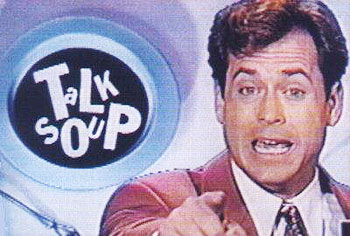Sleaze-O-Rama: Remembering the Halcyon Days of the Daytime Talk Show
Published on July 30th, 2011 in: Issues, My Dream Is On The Screen, TV, We Miss The Nineties |
For those not willing to stoop so low as to watch daytime talk, or more accurately, for those with jobs that kept them away from the entirety of the lineup, there was always the option of taking your daily allotment of sleaze by watching Talk Soup. The lone gem of the then-fledgling E! cable network’s early lineup, Talk Soup aired in 30-minute doses each evening, with an hour-long wrap-up show on the weekends. With clever writing and likely the smallest budget in television, the show both embraced and skewered the entirety of the talk show landscape, using clips from any show featuring a host and a regrettable moment.
Originally hosted by the witty and handsome Greg Kinnear, the show gave equal time to the legends (Oprah, Regis, Letterman) and the ’90s sleaze champs (Jerry, Sally, etc.) as well as the long-forgotten pretenders that attempted to ride the coattails of the talk show dynasty (Richard Bey and Yolanda, may your brief reigns forever be enshrined on YouTube). Talk Soup thrived on America’s talk show high and met its fate when the genre all but evaporated in the early 2000s. Nonetheless, it will always be remembered as being a perfect encapsulation of our collective reactions to what we were watching in lieu of pursuing actual hobbies.
Being of school age during the 1990s, I often found myself restricted to watching talk shows that aired in the afternoon. Where my elementary school days had me racing to my TV set at 4 p.m. to watch the double billing of Teenage Mutant Ninja Turtles and Adam West Batman reruns, my early teen years saw that same time slot’s airing of Jenny Jones as appointment television. Whether alone in my room or hanging out with friends, I always enjoyed delving into the salacious side of adulthood with Jenny and her audience while still retaining the belief that no matter what road in life I choose to take, it would never result in my appearance on her stage.
Some afternoons were spent bonding with my mother over paternity tests, promiscuous teens, and cheating spouses on Maury and The Montel Williams Show. Each guest was a chance to both judge and reflect upon a microcosm of society that was seemingly foreign to our own situations. On sick days (or more often, “playing hookey” days) from school, I watched with excitement as the early morning lineup of the Today show and Live with Regis and Kathie Lee gave way to the late morning drivel served up by Sally and The Jerry Springer Show. In addition to providing hours upon hours of mindless solo entertainment, daytime talk also served as a sort of icebreaker during the awkward social interactions that littered my similarly awkward early teen years.
The difficulty of my first significant stretch of time spent away from my parents (a two-week “nerd camp” at a state university) was tempered by the 11 a.m. gathering of fellow campers in the dormitory lounge to watch Jerry Springer and discuss the crazy playing out before us. The rigid social divides of middle school and high school were temporarily pushed aside whenever talk of yesterday’s talk show entered the classroom. Suddenly preppies, jocks, goths, and skater burnouts could bond over a mutual love of “Which of these nine men is my baby’s daddy?” In the adult world, water coolers, break rooms, and other neutral gathering spots provided similar opportunities for uniting. No matter our differences, we could all rejoice in society’s decline via televised degradation while also taking part in the time-honored tradition of laughing at others’ misfortunes.
Like many great movements of our modern era, the deterioration of the sleazy daytime talk show was a gradual one, with no one event or show signaling the beginning of the end. Some of the biggest names in the business were either being cancelled or facing falling ratings even before reality television took over the water cooler discourse. The few shows that remained on the air have languished in relative obscurity, while others were simply retooled in an effort for Oprah-like legitimacy. Newer talk shows tend to focus on garnering reactions out of scripted celebrity interactions, the foibles of their moronic hosts, or merely embracing the true source of modern entertainment: Amateur and professionally-produced satires and shock pieces on sites such as YouTube and Funny Or Die. The lesser talk show movement even has its own brilliantly hilarious chronicler in the form of Joel McHale and The Soup. Despite the signs of life, however, it is clear that the daytime talk show will never again have the impact on the country in quite the same way as its sleazy elders.
Pages: 1 2
Time limit is exhausted. Please reload the CAPTCHA.